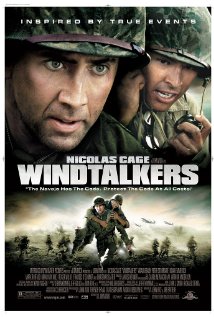
WINDTALKERS
US, 2002, 138 minutes, Colour.
Nicolas Cage, Adam Beach, Peter Stormare, Noah Emmerich, Mark Ruffalo, Brian Van Holt, Martin Henderson, Roger Willie, Frances O'Connor, Christian Slater, Jason Isaacs, Holmes Osborne.
Directed by John Woo.
In his Hong Kong films, director John Woo proved that he was a master of action. In the US, he made Hard Target, Broken Arrow and, particularly, Face/Off, before making Mission Impossible 2. But one of his Hong Kong films, Bullet in the Head, was a particularly vivid picture of the Vietnam War, offering a different perspective from the American films.
Now he has gone back to war with Windtalkers. Telling the story of a group of Navajo Indians whose language was used to create a code that was impossible for the Japanese to break, it takes us first of all to the battle of Guadalcanal. Here the focus is on Nicolas Cage as a unit leader who loses all his men in close combat and who returns to Hawaii with an ear defect and bitter attitudes. He is recruited to protect the Navajos in action so that they will be able to get messages through.
While the plot is interesting on paper, the second half of the film is gruelling to watch. It re-enacts in vivid post Saving Private Ryan intensity and detail, the step by step taking back of the island of Saipan from the Japanese. It opens in There is only so much war that one wants to and can watch during a two hour film. The cast does its best with Adam Beach as the main Navajo and Christian Slater as a windtalker guardian.
1. The impact of films about World War II? After so many decades? The war in the Pacific? American involvement? The Solomons and its strategic importance? The invasion of Saipan, pushing back the Japanese?
2. John Woo as a director, his Hong Kong films, gangster films, Vietnam war films? His career in the United States? His return to China for Chinese history? The blend of action and personal story?
3. The film coming soon after Saving Private Ryan, and The Thin Red Line, similarities?
4. The battle sequences, the way they were staged, spectacular, realism? The men, in action, weapons, bullets, bayonets, grenades, flamethrowers? The effect on them, on the enemy?
5. The stunt work, the advances of the men, the many deaths, the wounded? Acts of heroism?
6. The emphasis on the physical, close-ups, the many deaths, the War Graves, the wounded, hand-to-hand conflict?
7. The title, the focus on the Navajo, the men, the traditions, cultural, religious, linguistic? The code for American military use? The interpreters, their training, the code not being broken? The tribute to the success of the code?
8. Joe, Nicolas Cage, his story as a framework? The balance between his heroism and winning the war and the story of the windtalkers? Seeing him in action, in the Solomons, the soldiers, the many deaths, trauma, wounded, his grief? In hospital, Solomons? Rita and her attention, his determination to stand, to walk, for rehabilitation? His friendship and bonding with Rita?
9. The officers, his being given a task with the interpreters, his reaction, obeying orders? The importance of saving the code, even above the lives of the interpreters?
10. The Navajo, the reservation, Ben in himself, his leadership, love for his wife, his son, his picture and writing letters to him? Charley Whitehorse, his character? As Native Americans? In the context of the 1940s? The interviews, their ambitions, their work on the code, translations? Their being accepted, the effect, their pride?
11. The chosen squad, the variety of personalities, together, waiting, morale, playing cards, Ben playing, Charlie and his music? Joe and his sullen presence?
12. Private Chick, his character, bigotry, language, the insults, saying that the Navajo looked like the Japanese? The response of the others?
13. Shipping out to Saipan, the logistics, terrain, the Japanese, in the hills, firing, the trenches, the foxholes, the gun turrets? The difficulties of the mission?
14. The General, his leadership, interactions with the men – and his later being wounded, his death?
15. Sgt Anderson, his place in the group, his being the protector of Charley Whitehorse, his participation in the battles, his death?
16. Progress on taking the hill, keeping undercover, out of firing range, the dead and wounded, the details?
17. Ben, the importance of his sending the messages? The irony of the Americans and their cannons, finally firing on their own men?
18. Private Chick’s suggestion of Ben looking Japanese, the plan to put on the Japanese uniform, recover the Japanese radio, Joe and his courage in
retrieving it? The officer, the medal, Joe giving it to the other soldier to take home to the widow of the heroic young man?
19. The young man, his fears, carrying his comrades, being killed?
20. Overrunning the Japanese, the hand-to-hand fighting? The capture of Charlie, the prospect of his being tortured, Joe shooting him, the protection of the code? The effect on Ben? His anger and upset?
21. The aftermath of the war? Ben returning home, reunited with his family, his pride, achievement?
22. The final credits and the tribute?